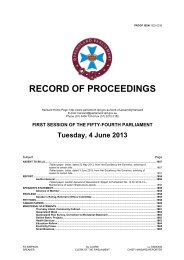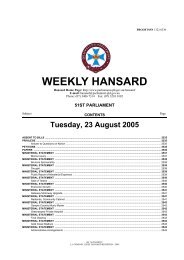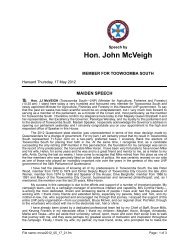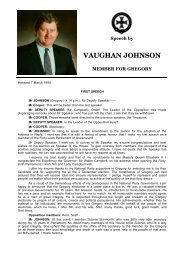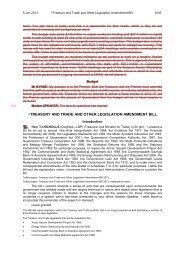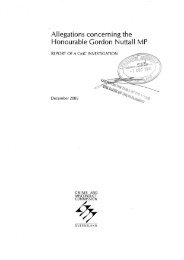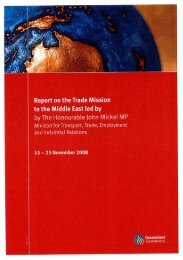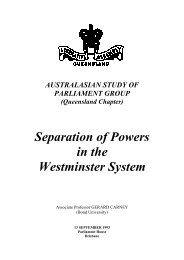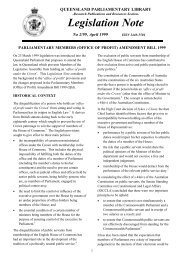Full transcript - Final - Queensland Parliament - Queensland ...
Full transcript - Final - Queensland Parliament - Queensland ...
Full transcript - Final - Queensland Parliament - Queensland ...
You also want an ePaper? Increase the reach of your titles
YUMPU automatically turns print PDFs into web optimized ePapers that Google loves.
9 Mar 1999 Land and Resources Tribunal Bill 371<br />
law. It is a body which, as I will discuss shortly,<br />
is subject to wide powers of ministerial override<br />
and so far as some non-presiding members<br />
are concerned, there is no right of appeal on<br />
matters of fact and only discretionary rights of<br />
appeal on matters of law. In short, it is a body<br />
that lacks true independence, is of limited<br />
jurisdiction and operates largely on its own. So<br />
to give to presiding members of this body the<br />
same entitlements as judges of the Supreme<br />
and District Courts is not only not necessary<br />
but also strikes at the status of judges of the<br />
superior courts of <strong>Queensland</strong>.<br />
I suggest to the Premier that if this<br />
Government is establishing a body to which it<br />
thinks it can appoint people whom it favours,<br />
then that will not only undermine the credibility<br />
of this tribunal but also the whole judicial<br />
system. In his reply, I ask the Premier to<br />
explain to this House why he has overseen the<br />
drafting of legislation that elevates presiding<br />
members to that status while there is<br />
absolutely nothing in the Commonwealth<br />
Native Title Act that would require it.<br />
As I said, this tribunal is not a body with<br />
self-executing decision-making powers; it is<br />
subject to broad powers of ministerial override.<br />
This point is made abundantly clear by the<br />
Scrutiny of Legislation Committee in<br />
Alert Digest No. 1 of 1999. The committee<br />
recommends that the Bill be amended to<br />
make it clear to readers that decisions of the<br />
tribunal are subject to ministerial override. As a<br />
firm believer in plain English drafting of<br />
legislation, I support this suggestion and I<br />
hope that at the Committee stage the Premier<br />
will be moving a minor amendment to give<br />
effect to this sensible suggestion.<br />
However, the other point that needs to be<br />
made is that this tribunal is really an integral<br />
part of the native title policy process. Whilst it is<br />
a quasi-judicial body with a degree of<br />
independence, it is certainly not a court of law<br />
in the sense that most people would<br />
understand that term. It is incumbent on the<br />
Premier and this Government not only to<br />
amend the Bill to highlight this basic fact but<br />
also to ensure that a perception is not allowed<br />
to arise that this tribunal has members of<br />
equal status and authority to judges of the<br />
Supreme and District Courts. I emphasise this<br />
point, because I am very concerned that this<br />
Bill and this tribunal should in no way derogate<br />
from the status, authority, independence and<br />
good reputation of our courts of law.<br />
As I mentioned, there is also no<br />
automatic right of appeal on questions of law<br />
from decisions of the tribunal to the president<br />
when it is constituted by a Land Court nonpresiding<br />
member or a mining referee. The<br />
leave of the president is required, but the Bill is<br />
silent on the matters that have to be taken into<br />
account in determining whether leave should<br />
be granted or refused. The Scrutiny of<br />
Legislation Committee has queried whether<br />
leave should be required when appeal rights<br />
are confined simply to questions of law. The<br />
committee has also suggested that if there are<br />
good reasons for not allowing an automatic<br />
right of appeal, that the legislation should be<br />
amended to prescribe grounds for the granting<br />
of leave.<br />
I cannot understand why litigants' rights<br />
are so narrowly regulated by this Bill. While in<br />
most instances hearings of the tribunal will be<br />
open to the public and the rules of natural<br />
justice must be observed, nevertheless the<br />
legislation requires the tribunal to—<br />
"Act as quickly, and with as little<br />
formality and technicality, as is consistent<br />
with a fair and proper consideration of the<br />
issues before it."<br />
However, in order to achieve this goal, this Bill<br />
provides that the tribunal is not bound by the<br />
rules of evidence, may inform itself of anything<br />
in the way it considers appropriate and may<br />
decide procedures to be followed for the<br />
proceeding. In short, litigants' rights are very<br />
much dependent upon the way in which the<br />
presiding or non-presiding member or<br />
members conduct the proceedings.<br />
One would think that in circumstances<br />
such as these that it would be absolutely<br />
essential that a dissatisfied litigant be able to<br />
appeal as of right to the president. The<br />
matters that this tribunal will be hearing could<br />
involve projects worth hundreds of millions of<br />
dollars, or even more. With so much at stake,<br />
it is simply not good enough that people's<br />
rights are handled in this way. From reading<br />
parts of this Bill, one would think that we were<br />
dealing with the Small Claims Tribunal and not<br />
the Land and Resources Tribunal, or that the<br />
matters it would be hearing involved a dispute<br />
over two weeks' rental bond money and not<br />
whether, for example, a mine could proceed or<br />
not. The tribunal is granted by the Bill exclusive<br />
jurisdiction to resolve disputes over negotiated<br />
settlements and to prevent acts adversely<br />
affecting a matter of cultural significance—in<br />
other words, all the sorts of disputes that go<br />
right to the heart of most mining activity in<br />
<strong>Queensland</strong>. So I say to the Premier that<br />
action should be taken to protect litigants'<br />
rights by amending the Bill and allowing an<br />
automatic right of appeal on questions of law<br />
and a discretionary appeal on questions of<br />
fact.



